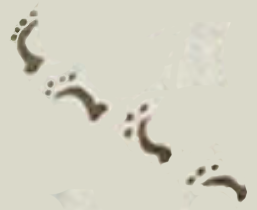oyaque (CST38)
This painting of the simplex glyph for the conjugated verb oyaque (they went, from the verb yauh, to go). It shows a bird’s eye view of an angled line of four alternating footprints, moving from lower right to upper left. These are the footprints of two nobles who went from Texupan to Mexico City, according to the companion text. For more on the Codex Sierra, see Kevin Terraciano’s study (2021), pp. 123, 157.
Stephanie Wood
Footprint glyphs have a great many readings, most of them involving movement across landscapes.
Stephanie Wood
1550–1564
Jeff Haskett-Wood
verbos, ir, viajar, viajes, Ciudad de México

yauh, to go, https://nahuatl.wired-humanities.org/content/yauh
fueron
Stephanie Wood
Códice Sierra-Texupan, plate 38, page dated 1561. Origin: Santa Catalina Texupan, Mixteca Alta, State of Oaxaca. Kevin Terraciano has published an outstanding study of this manuscript (Codex Sierra, 2021), and in his book he refers to alphabetic and “pictorial” writing, not hieroglyphic writing. We are still counting some of the imagery from this source as hieroglyphic writing, but we are also including examples of “iconography” where the images verge on European style illustrations or scenes showing activities. We have this iconography category so that such images can be fruitfully compared with hieroglyphs. Hieroglyphic writing was evolving as a result of the influence of European illustrations, and even alphabetic writing impacted it.
https://bidilaf.buap.mx/objeto.xql?id=48281&busqueda=Texupan&action=search
The Biblioteca Digital Lafragua of the Biblioteca Histórica José María Lafragua in Puebla, Mexico, publishes this Códice Sierra-Texupan, 1550–1564 (62pp., 30.7 x 21.8 cm.), referring to it as being in the “Public Domain.” This image is published here under a Creative Commons license, asking that you cite the Biblioteca Digital Lafragua and this Visual Lexicon of Aztec Hieroglyphs.







